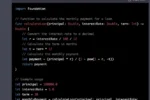Imagine a world where computers can think and learn just like us! That’s what the exciting field of artificial intelligence (AI) is all about. Recently, a famous entrepreneur named Elon Musk, along with a group of investors, made a huge offer of $97.4 billion to take control of OpenAI, the company he helped start. This news has sparked a lot of discussions because Musk believes OpenAI should focus on being safe and helpful for everyone. But there’s more to this story—Musk and OpenAI’s current leader, Sam Altman, have a complicated history. Let’s dive into the details of this intriguing battle over the future of AI!
| Attribute | Details |
|---|---|
| Bid Amount | $97.4 billion |
| Bidders | Elon Musk and consortium of investors, including xAI, Valor Equity Partners, Baron Capital, Atreides Management, Vy Capital, and 8VC. |
| Purpose of Bid | To gain controlling interest in OpenAI and return it to its original open-source, safety-focused mission. |
| Current Status of OpenAI | Initially founded as a non-profit in 2015, it transitioned to a for-profit entity in 2019 under CEO Sam Altman. |
| Musk’s Concerns | Claims that OpenAI’s for-profit model violates its original mission. |
| Litigation History | Musk was pushed out of OpenAI in 2019 and has been in litigation with Altman. |
| Future Plans of OpenAI | Plans to complete transition to a for-profit by late 2026. |
| Musk’s Response to Altman | Musk’s attorney claims they are prepared to match or exceed other offers for OpenAI. |
| Altman’s Reaction | Sam Altman tweeted a humorous response, suggesting he would buy Twitter for $9.74 billion instead. |
The Battle for OpenAI: Elon Musk vs. Sam Altman
The ongoing conflict between Elon Musk and Sam Altman over OpenAI is intense. Musk, who co-founded OpenAI in 2015, left the organization in 2019 after disagreements about its direction. He now wants to take control again with a massive bid of $97.4 billion. This move signals his desire to steer OpenAI back to its original mission of being open-source and safety-focused, which he believes has been lost under Altman’s leadership.
On the other hand, Sam Altman is focused on transitioning OpenAI into a profit-making entity. He argues that this change is necessary to secure funding and support from big companies like Microsoft. Altman’s vision for OpenAI is different from Musk’s, leading to a clash of ideas about the future of the organization. Their feud has escalated, making headlines as they both fight to define OpenAI’s role in the world of artificial intelligence.
What Does Musk’s Bid Mean for OpenAI?
Elon Musk’s bid for OpenAI could dramatically change the organization’s future. If his offer is accepted, it may lead to a merger between Musk’s AI company, xAI, and OpenAI. This could reshape how AI projects are developed and funded. Musk’s push for a return to open-source practices suggests he aims to prioritize safety and accessibility over profits, which is a significant shift from Altman’s current strategy of profit maximization.
However, the board of OpenAI faces a tough decision. They must consider whether to accept Musk’s bid or continue with their plan to become a fully for-profit entity by 2026. The outcome of this conflict could determine the direction of AI development and research. As both Musk and Altman position themselves in the tech landscape, their choices will not only impact OpenAI but also the wider world of artificial intelligence.
The Future of AI: OpenAI’s Transformation
OpenAI began as a non-profit with the mission to ensure that artificial intelligence benefits all of humanity. However, since its shift to a for-profit model under Sam Altman, there has been debate over whether this aligns with its original goals. Musk’s recent bid raises questions about what kind of organization OpenAI will become. Will it focus on profit or return to its roots of openness and safety?
As the landscape of artificial intelligence evolves, the decisions made by OpenAI’s leadership will be crucial. If Musk succeeds in his bid, it could lead to a renaissance of open-source development, which many believe is essential for safe and ethical AI. On the other hand, if Altman’s plans go ahead, OpenAI may continue down a path prioritizing investments and profits. The future of AI is at a pivotal moment, and the choices made now will shape it for years to come.
The Origins of OpenAI: A Dual Vision
OpenAI was founded in 2015 by Elon Musk and Sam Altman with a mission to ensure that artificial intelligence benefits all of humanity. Their vision was to create a non-profit organization that would prioritize safety and ethical considerations in AI development. This foundational principle aimed to prevent the misuse of AI technologies, fostering an environment of transparency and collaboration among researchers. The duo believed that the open-source approach would cultivate innovation while safeguarding against potential risks.
However, as OpenAI evolved, financial pressures led to the creation of a for-profit subsidiary in 2019. This controversial shift was intended to attract investments to fund ambitious projects and ensure the sustainability of the organization. Critics, including Musk, argued that this transition deviated from OpenAI’s original mission, raising concerns about profit motive overshadowing ethical responsibilities. This divergence laid the groundwork for the ensuing rift between Musk and Altman, highlighting the complexities of balancing innovation with ethical considerations.
Frequently Asked Questions
What is OpenAI and why was it created?
OpenAI is a research organization that focuses on creating safe and useful artificial intelligence (AI). It was created to ensure AI benefits everyone and is safe for society.
Who are Elon Musk and Sam Altman in relation to OpenAI?
Elon Musk and Sam Altman co-founded OpenAI in 2015. Musk left in 2019 after disagreements, and now they have different views on how OpenAI should operate.
What does it mean to be a non-profit organization?
A non-profit organization is a group that uses its money to help others instead of making profits for owners. OpenAI started as a non-profit to focus on safety in AI.
Why is Elon Musk bidding to buy OpenAI?
Musk believes OpenAI should return to its original goal of being open-source and safe. He wants to change it back to focus on helping everyone, not just making money.
What is the difference between a non-profit and a for-profit company?
A **non-profit** spends money to help people, while a **for-profit** company aims to make money for owners. OpenAI changed to for-profit to get more funding.
What could happen if Musk’s bid for OpenAI succeeds?
If Musk’s bid is successful, he might merge OpenAI with his own company, xAI. This could change how OpenAI operates and its focus on safety.
What are the implications of OpenAI becoming for-profit?
If OpenAI fully becomes for-profit, it might prioritize making money over its original mission of ensuring AI is safe for everyone. This could affect how AI is developed.
Summary
Elon Musk, alongside a group of investors, has made an unsolicited $97.4 billion bid for a controlling interest in OpenAI, aiming to revert the organization to its original non-profit, safety-focused mission. Musk, who co-founded OpenAI but was ousted in 2019, argues that the shift to a for-profit model undermines its foundational goals. This bid threatens OpenAI CEO Sam Altman’s plans for a full transition to a for-profit entity by 2026. Musk’s consortium includes several investment firms, and the outcome of this bid could significantly impact the future direction of OpenAI and its operations.







